

Most ebook files are in PDF format, so you can easily read them using various software such as Foxit Reader or directly on the Google Chrome browser.
Some ebook files are released by publishers in other formats such as .awz, .mobi, .epub, .fb2, etc. You may need to install specific software to read these formats on mobile/PC, such as Calibre.
Please read the tutorial at this link: https://ebookbell.com/faq
We offer FREE conversion to the popular formats you request; however, this may take some time. Therefore, right after payment, please email us, and we will try to provide the service as quickly as possible.
For some exceptional file formats or broken links (if any), please refrain from opening any disputes. Instead, email us first, and we will try to assist within a maximum of 6 hours.
EbookBell Team

5.0
38 reviewsInterest in language play and linguistic creativity has increased in recent years, and the topic has been taken up from a variety of perspectives. In this book, disparate approaches to the topic are brought together, demonstrating that a number of phenomena whose similarities might not have been immediately recognized, have an academic home under the umbrella of language play and linguistic creativity. The contributions to this collection illustrate the variety of questions that can be asked regarding the social, cognitive, emotional, political, and cultural mechanisms and significance of innovative linguistic practices and point to new directions of inquiry. Furthermore, the work exemplifies a variety of ways in which this research can be carried out, as well as the range of contexts in which it might be investigated, including second language classrooms, online settings, and workplaces. Taken together, the chapters serve to illustrate the range of work that we will be accepting in the Language Play and Creativity series; viewed individually, each makes a unique contribution to some aspect of our understanding of creative language use.